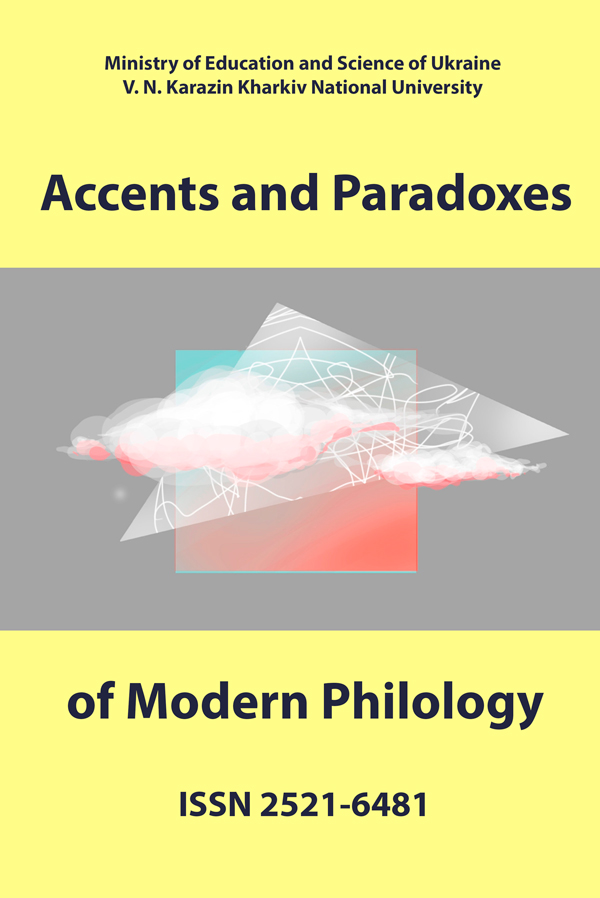The dialogue between the poet’s pure soul and nature: transformation, interpretation and translation
Abstract
The dialogue between the Poet and Nature includes discussion of pure Soul with pure Reason since the late 18th century. The literary discussion was based on thesis of infinite and antithesis of the final human nature. Literary personifications and comparisons characterized a personality temperament as a type of universal nature and psychophysical parallelism. The Greek concept of cyclical time has been problematical for philosophers and poets and became concept of epoch in the work about Seasons, where Winter, Spring, Summer and Autumn symbolized the human life: birth, death, maturity and decline. The nature is represented in poetry on both directions vertically and horizontally. There also existed a tradition of allegorical interpretation of soul from pagan myths. Metamorphoses of soul have been observed in the mythopoetical paradigm of “death and life” including a medieval motif of tragic incompatibility between Man and God. In ancient tradition the universe and the natural laws are personified in allegorical terms, and the earth is represented as a giant living organism. The later poetry is similarly intended to illustrate these ideas assimilated into the concrete lived experience. Since the 19th century attention was given to human beings and to the soul in dissolution with nature.
Downloads
References
Виньи, А. де. (1987). Избранное. Москва: Искусство.
Европейская поэзия XIX века (1977). Серия: Библиотека всемирной литературы. Москва: Художественная литература.
Жирмунский, В. М. (1914). Немецкий романтизм и современная мистика. СПб.: Типография товарищества А. С. Суворина «Новое время».
Жужгина-Аллахвердян, Т. (2016). Античный символизм и французская романтическая поэзия 1820-х гг. Истоки мифопоэтики. Монография. Саарбрюккен: Lambert Academic Publishing.
Западноевропейская лирика (1974). Сост., вступ. ст., примеч. Н. Я. Рыковой Ленинград: Лениздат.
Зольгер К. В. Ф. (1978). Эрвин. Четыре диалога о прекрасном и об искусстве. Москва: Искусство.
Иванюк, Б. П. (1998). Метафора и литературное произведение (структурно-типологический, историко-типологический и прагматический аспекты исследования).Черновцы: Рута.
Казарин, Ю. (2011). Последнее стихотворение. 100 русских поэтов XVIII–XX вв. Антология-монография. Екатеринбург: Изд-во Уральского государственного университета.
Корнеев, Ю. `(2000). Рог. Из французской лирики. СПб.: Кристалл.
Левик, В. (1977). Избранные переводы. Т. 1. Москва: Художественная литература.
Поэзия Европы (1977–1979). В 3-х т. Т. 1. Cост. Е. В. Витковский и др. Москва: Художественная литература.
Поэты "Искры" (1987). В 2-х т. Том первый. В. Курочкин. Изд. 3-е. Ленинград: Советский писатель.
Румянцева, В. Н. (2007). “Стихотворный фельетон середины XIX века: Н. А. Некрасов, В. С. Курочкин, Д. Д. Минаев”, Канд. филол. наук., 10.01.01 – русская литература, Оренбургский государственный университет, Оренбург, Россия.
Русская мысль (1886). Ежемесячное литературное и политическое издание. Год седьмой, Книга VII, Х. Москва: Типография И. Н. Кушнерева.
Современник (1864), № 4. Т. 101.
Современный мир (1908) . Л II. № 10.
Французские стихи в переводах русских поэтов XIX–XX вв. (1969) [сост. Е. Эткинд]. Москва: Прогресс.
Хрестоматия по зарубежной литературе XIX века (1955). Ч. 1. Сост. А. Аникст. Mосква: Учпедгиз.
Archibald, S. (2009). Le texte et le technique. Quebec: Gauvin.
Auden, W. H. (1977). Restoration and Augustan Poets. Milton to Goldsmith. Volume III. Penguin Books.
Germain, F. (1964). “Saveur de la Gravité”, Revue d’histoire littéraire de la France, Avril-Juin. Paris: Armand Colin.
Keats, J. (1988). The Complete Poems. Penguin books.
Rousseau, J. J. (1992). Les Confessions. Rousseau. L'autobiographie.
Chateaubriand, N. Sarraute, F. Dolto. Paris: Hatier.
Rousseau, J. J. (s. d.) Dialogues. Rêveries d’un promeneur solitaire. Correspondance. Notice par P. Richard. Paris: Libr. Larousse.
Strivay, L. (2017). J. A. Roucher, Les Mois, Liège, Lemarié, 1780. Petites questions à la librairie et à la censure. [online] Orbi.ulg.ac.be. Available at: http://orbi.ulg.ac.be/handle/2268/93355 [Accessed 26 Oct. 2017].
Vigny, A. de. (1965). Œuvres complètes. Paris: Seuil.




